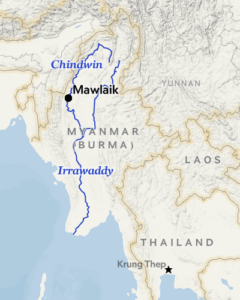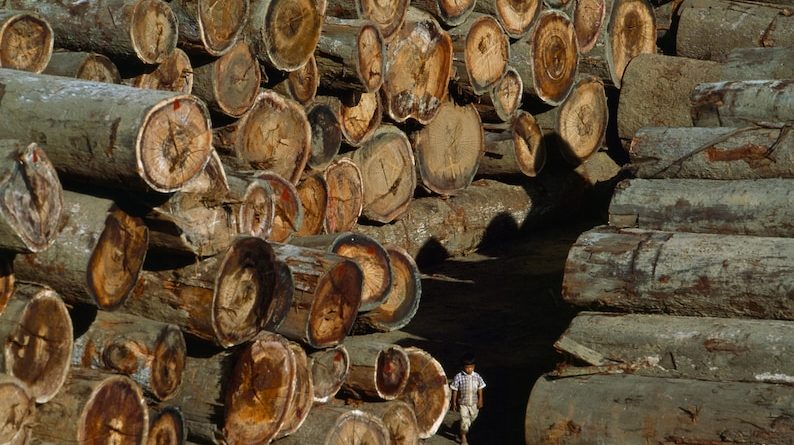FREE ASEAN-DEMOCRACY: “The Myanmar Chronicle”- MAWLAIK, MYANMAR- Myanmar struggles to preserve its teak groves
Demand in China, India, and Europe drives illegal logging of this valuable, versatile hardwood.
After a century of logging, Myanmar struggles to preserve its teak groves

Demand in China, India, and Europe drives illegal logging of this valuable, versatile hardwood.
.
MAWLAIK, MYANMARWe walk east from the Indian frontier.
.

.

We climb into the lumpy, misty, cool jungles of the Chin Hills of Myanmar, guided by a bald Buddhist monk wearing a limpet hat. The monk’s feet give out after 11 miles. He sits down, rubs his sore toes, smiles, waves us on. We lope down a cracked road to the Chindwin River. At the muddy riverbank, from the docks of an old logging outpost called Mawlaik, we see a forest on the move: Hundreds of massive logs piled high onto barges drift south on wide, brown currents. Some of this cargo may end up under your feet, under your butt, under your knife. Mostly, it is teak.

Teak: Tectona grandis. One of world’s most valuable tropical hardwoods. High tensile strength. Easily worked lumber. Rich in weather and pest resistant natural oils. Popular for patio furniture, countertops, cutting boards. Teak’s high silica content—which renders a matte surface when polished—make it an attractive, non-slip decking material on yachts. For centuries, teak was the steel of navies. One of oldest British warships in existence, the H.M.S. Trincomalee, built in Bombay in 1816, still floats thanks largely to her sturdy teak hull.
 ___________________________
___________________________
SPACE RESERVE FOR ADVERTISEMENT
_________________________________________________
Roughly half the wild teak left on Earth grows in Myanmar.
“We are trying to save the trees that are left, but it’s late,” says Than Tun Aung, a retired geography teacher whose small environmental group, Mawlaik Network, is trying to stop illegal logging in his isolated region. “We started our efforts because we couldn’t stand the situation anymore. Most of the forests nearby already are destroyed.”
Rampant teak logging in Myanmar, also called Burma, is more than a century old.
British colonial firms seized huge forest tracts and dragged out fortunes in wood by elephant. Trees were girdled first and left standing for two or three years. Then the dead trunks were cut and floated down jungle rivers for sawing. That selective method prevailed until the 1990s, until a booming global demand for hardwoods—largely driven by China but also by India, Europe, and elsewhere—began to strip Myanmar’s tree cover wholesale. Since 1990, the nation has lost 58,000 square miles of forests, an area roughly the size of Michigan. (Experience the sights and sounds of a shrinking virgin forest.)
 ___________________________
___________________________
SPACE RESERVE FOR ADVERTISEMENT
_________________________________________________
In 2014, the government finally cracked down.
Authorities imposed a strict ban on exporting wild-grown teak logs. And to show they meant business, troops collared 153 mostly Chinese illegal loggers, who the courts condemned to life in prison. (In Myanmar, this is 20 years.) Since then, to ease the economic pain, officials have loosened the ban somewhat to allow sales of stockpiled timber and plantation trees. But teak’s immense value—timber earns Myanmar hundreds of millions of dollars a year—still stokes corruption. Illicit logging persists, even during the global coronavirus pandemic.
“It’s all off the books,” says Aung, the elderly environmentalist in Mawlaik. “All the cronies who do it use a perfect system. They pay half the workers’ wages in drugs. So the laborers become addicted.”
Aung and three of his forest monitors meet me in a sweltering teahouse beside the Chindwin River. One is another retiree. The others are middle-aged shopkeepers. They angrily display photos of illegally cut logs on their smart phones. I ask them why they are activists.
“We remember when the forests were whole,” Aung says, after a long pause. “Our young people do not.”
Teak: During the Kongbaung Dynasty—the last line of Burmese kings deposed by the British in 1885—a “foundation sacrifice” sometimes was carried out to protect royal palaces or cities. The human victim, known as a myosade, was ceremonially crushed under a large teak log at the gates to ensure future impregnability. The person who died became a nat, a spirit, who protected the site.
Such nats can also inhabit certain mighty, old teaks. Best never lay an ax into them.
 ___________________________
___________________________
SPACE RESERVE FOR ADVERTISEMENT
_________________________________________________
We cross the Chindwin on a ferry.
We walk east to a Buddhist monastery in the village of Pyin Gaing. A large structure, elevated on pylons, it is constructed entirely from tons of teak. We sleep in it.
“We have a ‘before the chain saw’ and ‘after the chain saw’ story,” says U Nu Tin, the friendly village headman. “With hand saws, we cut selectively. It was work. We wouldn’t cut trees in certain places, like on steep slopes. Now, with chainsaws, we cut everything—all sizes, all terrain. And so the forest has dried up.” Tin adds: “The water table was about 300 feet before. But it is dropping. The trees are going, so the water is going.”
Near Thickegyin, a major crossroad, a young farmer named Myo Minaung shows us a shortcut through the forest.
“The rice harvests have really gone down,” Minaung says. “Logging is better.”
Farm labor, he explains, pays just $3 to $5 a day. Cutting down teak earns a minimum of $6. But since the arrival of outside businessmen who haul the logs away “without permission” in trucks, he and his fellow villagers must wander farther and farther to find trees. On the shortcut, we slog six hot miles through secondary forest. I see no teaks more than 15 feet tall: saplings.
Teak: Milled, the wood smells like oiled leather. Its color ranges from honey brown to tawny gold. Exposed to the elements, it ages to the grey of human hair. The big kings grow to 130 feet. Their leaves can span a yard across—the size of an umbrella. A specimen in Thailand is alleged to be 1,500 years old.
The forest is virgin at a place with no name. Walking through it is like walking through a body.
There is no up or down. There are fifty billion shards of green. There is a loud ache of moving noise: whistling birds, clicking insects, the whoop and cough of unseen gibbons. Birth must sound like this. The teaks are so colossal I cannot get my open arms even halfway around them. A wet place. Blinking in the white sun, I stagger out onto a newly graded jungle road, soaked through.
They boil water for noodles. They are good boys. Shy boys. Generous in their poverty. They don’t know what they’re doing: merely opening another road into the forest. Integrating something as something else disintegrates. I watch their instant coffee dissolve in my cup, like a clod washed away by the sea.
_______________________________________










